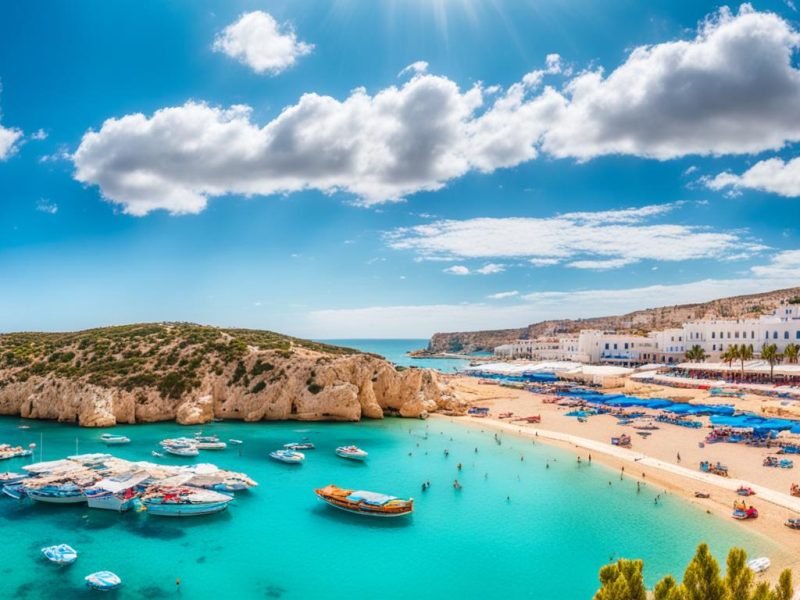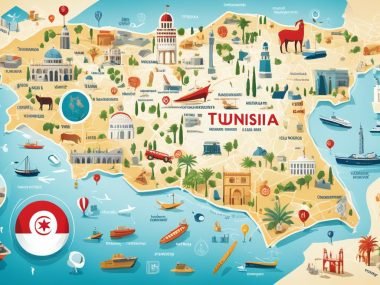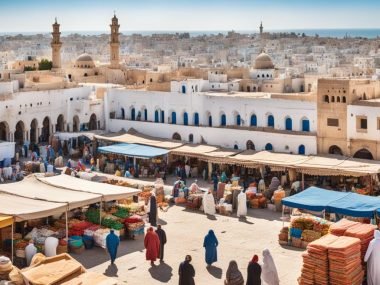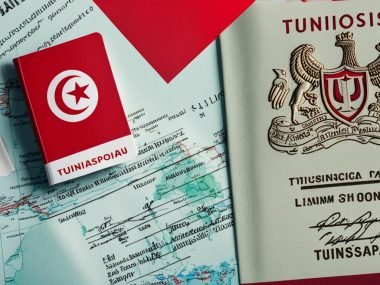As I embarked on my journey of living abroad in Tunisia, the land perched on Africa’s northernmost tip beckoned with promises of Mediterranean warmth, a lifestyle infused with a rich tapestry of cultures and a sense of community that would soon feel like home. The Tunisia expat community, a blend of diverse nationalities, intrepid adventurers, and career-seeking professionals, quickly dispelled any uncertainties I had about moving to this corner of the world. Together, we’re discovering the pleasures and challenges of expat life Tunisia unfolds.
The decision to move to Tunisia as an expat meant unpacking not just my belongings but also my preconceived notions of what life in North Africa could offer. From the storied ruins in Carthage, the olive groves of the Sahel, to the sprawling souks of Tunis, every experience has been a revelation. Adopting Tunisia as my new home has been a narrative of embracing the old with the new, the traditional with the modern, all while navigating the intricate dance of social customs and languages that are the heartbeat of this vibrant nation.
Indeed, moving to Tunisia expats are greeted with a dichotomy; a nation where the official language—Arabic—intertwines with the eloquence of French, painting daily interactions with a European flair. In the realm of healthcare, private facilities in Tunis present an exceptional standard that reassures the health-conscious expat. Yet, the pace of life here is not without its cautions, as staying vigilant, particularly in bustling markets and near borders, is a subtle art that every expat learns over time.
Key Takeaways from Embracing Expat Life in Tunisia:
- Discover the surprise of cultural diversity Tunisia offers beyond its geographical location.
- Communicate easily within the business and social settings, thanks to the widespread use of French.
- Experience high-quality private healthcare services, particularly in the capital city Tunis.
- Acknowledge potential safety concerns, adapting to local customs for a harmonious life.
- Enjoy the cost benefits of a low living expenditure ranked favorably by Mercer’s survey.
- Network within an inclusive expat community, poised for both professional and personal growth.
Understanding Tunisia’s Cultural Melting Pot
My exploration of Tunisia has unraveled the rich fabric of its society—a place where history weaves through every street corner, and vibrant markets burst with the offerings of a multicultural legacy. As an expatriate, the allure of this North African jewel is not solely in its picturesque landscapes or the warmth of the Mediterranean clime, but profoundly in the complex confluence of cultures that greets every newcomer. The expat guide Tunisia offers not only acts as a beacon to those enticed by its ancient shores but also serves as a testament to the country’s mosaic of influences.
A Blend of Cultures and Languages
Echoes of Amazigh chants, the flamboyance of Andalusian artistry, and the reverberations of Arab traditions paint a vivid picture of Tunisian identity. It’s a spectrum of cultural hues that has charmed expats from various corners of the globe—France, Italy, and Spain, bringing tastes of home to an already intricate palette. Arabic, the nation’s official language, offers a lyrical backdrop to the everyday life, while French provides an accessible lingual bridge in business and social scenes. The expat benefits in Tunisia are manifold, but the one that stands out is the opportunity to converse seamlessly amidst a medley of languages and customs.
Safety and Political Landscape for Expats
Navigating the winding streets and bustling souks requires more than a good sense of direction; it demands an awareness of the country’s political heartbeat. For us expats, staying abreast of local and regional developments is not a choice but a necessity, as we chart our paths amidst the ebb and flow of the political tide. Vigilance in crowded spaces is a skill honed over time, and the women in our community are especially mindful, as street harassment remains an unwelcome challenge. Yet, in this tapestry of life, the progressive strides of Tunisia, particularly in the sphere of women’s rights, offer a reassuring thread of social advancement and mutual respect.
Community and Social Life for Expats
In the heart of Tunis, Sousse, or Sfax, lies the pulse of the Tunisia expat community—united, supportive, and thriving. Integration is not just a concept but a living experience, which I’ve felt deeply in my personal and professional interactions. The willingness of Tunisians to embrace diversity transforms every cup of mint tea shared and every mosque visit into bridges of friendship and understanding. Living here, amidst this welcoming ethos, I find not only the quaint charm of Tunisia’s traditions but also the open arms of a society that champions a global village philosophy.
As an expat, I revel in the knowledge that my choice to make Tunisia my home is not just about absorbing its culture or enjoying the scenic vistas. It is also about becoming a part of something larger than myself—a community where every day is a celebration of unity in diversity and where the benefits of expat life foster bonds that extend beyond borders.
Embracing the Tunisian Lifestyle: Realities of Expat Life
Immersing myself in expat life Tunisia, I’ve learned the delicate balance of respecting local social customs while expressing my own cultural identity. Adapting to these norms is vital for all those relocating to Tunisia expat individuals, as it paves the way for a more integrated and enjoyable experience in this multifaceted country.
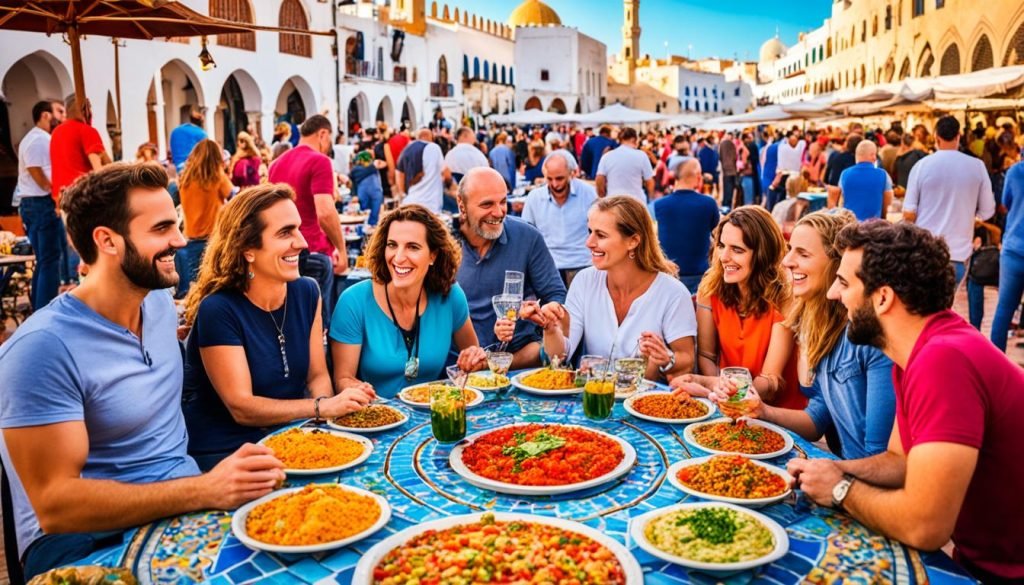
Social Customs and Behavior
The social fabric of Tunisia is woven with threads of modesty and respect. Here, dressing conservatively, especially when visiting religious sites, is more than just a suggestion—it’s an inherent part of everyday life. Through my journey, I’ve learned that observing these customs isn’t just about blending in, it’s about showing reverence for Tunisia’s rich Islamic heritage.
Women in Tunisian Society
Living as a woman in Tunisia’s predominantly Islamic society, I’ve observed firsthand the nation’s progressive approach to gender roles. Contrary to many of its Middle Eastern counterparts, the Tunisian community encourages women’s active participation in business and leadership roles, a sign of its acceptance and advancement.
Cost of Living Considerations
The decision to apply for a Tunisia expat visa was made easier when I considered the country’s affordability. Tunisia’s cost of living has proven favorable, especially compared to other expat hubs. This economic advantage means not having to sacrifice quality of life for economic stability, a significant factor for anyone considering joining the Tunisia expat community.
| Expense Category | Cost in Tunisia (USD) | Cost in the US (USD) |
|---|---|---|
| Housing (1-bedroom apartment in city center) | 250 | 1,500 |
| Utilities (monthly) | 50 | 150 |
| Groceries (monthly average for 1 person) | 150 | 300 |
| Dining Out (mid-range restaurant for two) | 20 | 60 |
| Public Transportation (monthly pass) | 20 | 75 |
The Tunisian Economic Scene: Work and Business Opportunities for Expats
Moving to Tunisia as an expat, I am fascinated by the dynamism of its economic scene that is as diverse as the country’s landscape. For those of us who are career-driven, Tunisia lays out a platform where petroleum, mining, and manufacturing industries are vital contributors to its economy, offering a myriad of opportunities for skilled expats, particularly in senior management roles. My experience, thus far, has taught me that navigating the business customs and regulations in Tunisia is crucial for achieving success in these sectors.
Core Industries and Job Prospects
Life for expats in Tunisia within the core industrial sectors means being at the heart of the country’s economic growth. High-level positions in petroleum, mining, and manufacturing are the mainstays for expats here, with lucrative job prospects shaping our professional journeys. The support within these industries often serves as a powerhouse for innovation and progress, and it’s awe-inspiring to see how expatriates significantly contribute to the Tunisian economy.
Establishing a Business in Tunisia
Embarking on entrepreneurship in a foreign land comes with its challenges and triumphs. In Tunisia, setting up a business requires understanding local market dynamics and laws, which is vital for any expat venturing into this realm. The expat benefits in Tunisia come to light particularly through the encouragement and assistance provided to foreign investors, which I’ve found to be quite invigorating for budding entrepreneurs like myself.
Networking and Expat Community Support
The Tunisia expat community has been nothing short of welcoming, rendering a web of support for both social and professional enrichment. Networking events within this community are common, often opening doors to new business ventures or jobs. It’s reassuring to know that we can rely on the experiences and knowledge of fellow expats who have a shared interest in seeing us thrive in our new Tunisian home.
As I navigated the Tunisian economic scene, it became clear that the lifestyles we expats build are balanced by the country’s cost-efficient living and enticing professional prospects. Together, these facets make for an appealing case for moving to Tunisia expats, encouraging an increasingly prosperous international community within its borders.
Practical Aspects of Relocating: Healthcare, Housing, and Education
As I consider the finer details of my move, the expat guide Tunisia proves invaluable in illuminating the practical aspects of expat life Tunisia. Anchoring this relocation are three crucial pillars: healthcare, housing, and education. My forthcoming adventure into the Tunisia expat community beckons a thoughtful approach to each, ensuring my tenure here is comfortable and well-furnished for the demands of everyday life.
Healthcare, the first of these cornerstones, demands particular attention. Public facilities, while accessible, fall shy of the Western standard I am accustomed to, commonly beset by crowdedness and language barriers. The pursuit of private healthcare becomes not just a preference but a necessity, urging a comprehensive insurance plan as a bulwark against the uncertainties of health and well-being in a new environment.
Housing, my next port of call, offers a smoother sail within Tunisia’s larger cities. Their pulsing hearts are lined with a variety of accommodations, marking a blend of comfort and convenience, all connected to the vital services that sustain everyday expat existence.
Education presents a nuanced tapestry, especially pertinent for those of us with young ones in tow. While a smattering of international schools peppers the capital, Tunis, accompanying fees prompt a wistful glance towards alternative education shores in neighboring Morocco, Spain, or France.
| Aspect | Details |
|---|---|
| Healthcare | Prefer private insurance for higher quality care and language compatibility |
| Housing | Abundant in cities, with modern comforts and easily accessible services |
| Education | Options available predominantly in Tunis, with possible consideration of boarding schools abroad due to costs |
To realize a seamless transition, I gauge each facet with care, leaning on an ever-expanding network of expatriates who lend their wisdom freely. This preparation is the cornerstone upon which my Tunisian life will be built, a foundation as sturdy as the Mediterranean breezes are balmy.
Getting Around in Tunisia: Transport Options for Expats
As part of the vibrant Tunisia expat community, one of my priorities upon moving to Tunisia expats was to figure out the transportation landscape. The need for mobility and independence is paramount when living abroad in Tunisia, and discovering the range of transport options available has been an essential step in making the most of my new environment. Moving to Tunisia expats will find that the country’s transportation infrastructure supports an adventurous spirit and facilitates daily routines remarkably well.
Local and Regional Transportation Insights
For newcomers finding their footing in Tunisia, getting around locally can be surprisingly efficient and cost-effective. Taxis, easily recognizable by their bright yellow exterior, are a dependable choice for city commuting. Collective taxis also known as “louages,” offer an interesting mode of transportation for those looking to connect to various parts of Tunis at a shared expense. The TGM train, as well as Tunis’ light rail system, simply referred to as the Metro, are pivotal in easing daily transit and are an experience in themselves, merging convenience with a taste of local culture.
Navigating Tunisian Roads and Public Transport
Driving in Tunisia, while an option for the more daring expats, comes with its share of cautionary tales. Venturing beyond urban centers means preparedness for less predictable road conditions and mandatory defensive driving. Public transport, in contrast, is extraordinarily wallet-friendly and offers a safer alternative. The bus network, spanning cities and rural areas alike, stands out for its comfort and reliability, trumping the need to navigate the driving landscape for everyday transit needs.
Domestic Travel and Alternative Transport Modes
The allure of travel is irresistible, and Tunisia doesn’t disappoint. Domestic flights are a time-efficient way to connect with major cities like Sfax and Djerba, while ferries provide regular services to Mediterranean islands, adding charm to the Tunisian travel experience. The plethora of transport options complements the lifestyle of living abroad in Tunisia, inviting expats to explore and immerse themselves in the nooks and crannies of this dynamic country while satisfying the practical needs of the expat life.

